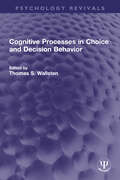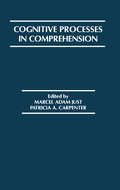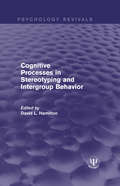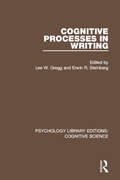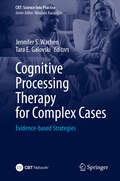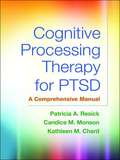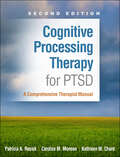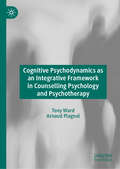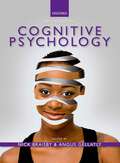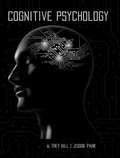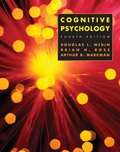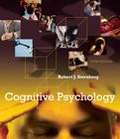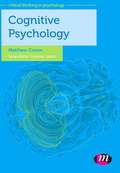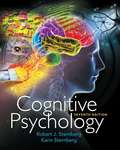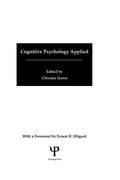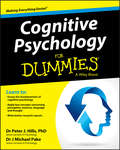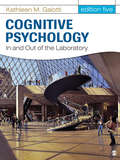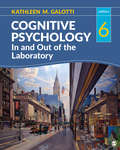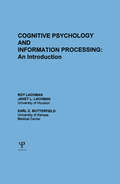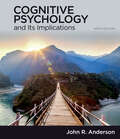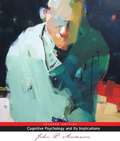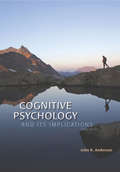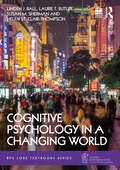- Table View
- List View
Cognitive Processes in Choice and Decision Behavior (Psychology Revivals)
by Thomas S. WallstenDecision theory is a uniquely interdisciplinary field of study with contributions from economics, statistics, mathematics, philosophy, operations research, and psychology. The 1970s had seen important changes in research on behavioral decision theory in terms of a shift from a reliance on economic and statistical models to an emphasis on concepts drawn from cognitive psychology. Originally published in 1980, Cognitive Processes in Choice and Decision Behavior contains papers that explore the reasons why these changes had come about and discuss the future directions to which they pointed. It was clear at the time that research in behavioral decision theory was changing dramatically. The chapters in this book represent a good assessment of the reasons the changes were coming about and some of the merits and problems of the directions in which it was moving. Today it can be read in its historical context.
Cognitive Processes in Comprehension (Carnegie Mellon Symposia on Cognition Series)
by Marcel Adam Just Patricia A. CarpenterFirst published in 1978. Cognitive Processes in Comprehension is a look at what goes on in the mind of the listener or reader when he hears a sentence during a conversation or reads a passage in a book. For most adults, comprehension is rapid, automatic, and effortless. But, despite its apparent simplicity, comprehension includes a myriad of subprocesses, each of which by itself constitutes a formidable computational task.
Cognitive Processes in Stereotyping and Intergroup Behavior (Psychology Revivals)
by David L. HamiltonOriginally published in 1981, this volume brings together contributions by several of the authors whose research had contributed significantly to the recent advances in our understanding of the role of cognitive processes in stereotyping and intergroup behaviour at the time. While each chapter reflects a cognitive approach to its subject matter, a broad range of topics, issues, and contexts is addressed by this collection of authors. In the introductory chapter the authors present an historical overview of psychological research on stereotyping, discussing historical trends in this literature and summarizing the conceptual orientations which had guided research in this area at the time. This chapter not only provides useful background information for the reader but also presents a broader context within which the current cognitively oriented research, on which the remaining chapters focus, can be viewed. Each of the next six chapters reports on integrative program of studies bearing on some aspect of the relationship of cognitive functioning to stereotyping and/or intergroup behaviour.
Cognitive Processes in Writing (Psychology Library Editions: Cognitive Science)
by LEE W. GREGG AND ERWIN R. STEINBERGOriginally published in 1980, this title began as a set of questions posed by faculty on the campus of Carnegie-Mellon University: What do we know about how people write? What do we need to know to help people write better? This resulted in an interdisciplinary symposium on "Cognitive Processes in Writing" and subsequently this book, which includes the papers from the symposium as well as further contributions from several of the attendees. It presents a good picture of what research had shown about how people write, of what people were trying to find out at the time and what needed to be done.
Cognitive Processing Therapy for Complex Cases: Evidence-based Strategies (CBT: Science Into Practice)
by Tara E. Galovski Jennifer S. WachenFocusing on a front line treatment for posttraumatic stress disorder (PTSD) and related problems, this book bridges science and practice to provide clinicians with an important tool for use across populations and settings. It is a detailed, yet digestible, review of the literature supporting the use of Cognitive Processing Therapy (CPT) followed by relevant clinical implications for evidence-based practice. Clear connections are made between case conceptualization and actual treatment. Chapters include case examples with client-therapist dialogue to provide practical guidance for clinicians delivering CPT with each patient population. Additionally, guidance for implementing CPT in alternative treatment formats (e.g., group treatment, intensive delivery modalities, and telehealth) and advice for navigating systemic barriers and disseminating CPT across different healthcare settings are included. Each chapter, written by a leading expert in each topic area, ensures that this book provides a comprehensive guide to enhance clinicians&’ knowledge and skill in CPT treatment delivery across a wide range of complex patient populations, presentations, and treatment settings.
Cognitive Processing Therapy for PTSD: A Comprehensive Manual
by Patricia A. Resick Candice M. Monson Kathleen M. ChardIt explains the theoretical and empirical underpinnings of CPT and discusses how to adapt the approach for specific populations, such as combat veterans, sexual assault survivors, and culturally diverse clients. The large-size format facilitates photocopying and day-to-day use.
Cognitive Processing Therapy for PTSD: A Comprehensive Therapist Manual
by Candice M. Monson Patricia A. Resick Kathleen M. ChardThe authoritative presentation of cognitive processing therapy (CPT) for posttraumatic stress disorder (PTSD) is now in a revised and updated second edition, with an easier-to-use format and a new chapter on conceptualizing treatment. From CPT's developers, the manual includes session-by-session implementation guidelines and extensive sample dialogues. Shaded index tabs in the margins help clinicians quickly navigate to each session. The authors explain the theoretical and empirical underpinnings of CPT and discuss ways to work effectively with specific populations, such as combat veterans, sexual assault survivors, and culturally diverse and LGBTQIA+ clients. Forty-eight reproducible handouts can be photocopied from the large-size book or downloaded from the companion webpage. New to This Edition *Each session now has its own chapter, printed with shaded tabs for easy reference. *Reflects a wealth of new treatment research, conceptual refinements, and feedback from trainings of thousands of clinicians. *Chapter on cognitive case conceptualization. *Discusses additional treatment variations (telehealth, intensive CPT) and client populations (first responders). CPT is endorsed as a best practice for the treatment of PTSD by the U.S. Departments of Veterans Affairs and Defense, the International Society for Traumatic Stress Studies, and the U.K. National Institute for Health and Care Excellence (NICE). See also Getting Unstuck from PTSD, by Patricia A. Resick, Shannon Wiltsey Stirman, and Stefanie T. LoSavio, which presents CPT in a guided self-help format for trauma survivors.
Cognitive Psychodynamics as an Integrative Framework in Counselling Psychology and Psychotherapy
by Tony Ward Arnaud PlagnolThis book proposes a novel method of combining the current approaches to counselling and psychotherapy into one coherent framework. The authors argue that the cognitive behavioural tradition (largely focused on thought patterns) and the psychodynamic approach (centred on the client’s experience and relationships), can be successfully integrated with insights from cognitive neuroscience, to form a fruitful synthesis. In doing so they provide a perspective that will enable practitioners to more fully appreciate each client’s unique inner world, based on their individual history and environment.The authors point towards the brain’s innate ability to understand and learn from experience so as to direct the growth of that inner world. This book elaborates a method of tapping into this innate growth potential, so as to help clients move forward when they have become trapped in non-productive patterns or mental stalemates. It will provide fresh insights and a valuable resource for counselling psychologists, counsellors and psychotherapists, as well as for academics and students in these fields.
Cognitive Psychology
by Angus Gellatly Nick BraisbyCognitive processes enable us to experience the world around us: to recognise a friendly face in a crowd, to communicate our passions, to recall memories from the past. When these processes stop working, it can turn friends into strangers, render speech impossible, and make history a confusion of truth and lies. Cognitive Psychology, Second Edition unravels these complex ideas, introducing the concepts behind them and looking at how techniques, such as neuroimaging, can provide answers to questions that may at first seem unanswerable. The chapters - covering a broad range of topics, including attention, perception, and neuropsychiatry - are written to inspire students, and come complete with helpful resources, including in-chapter summaries to consolidate learning, 'Activity' boxes to help students engage in the content, and 'Research study' boxes to encourage an awareness of scientific method. With chapters written by experts in their fields and edited by professors with a wealth of experience in teaching and learning, Cognitive Psychology, Second Edition is the ideal course companion for all psychology students.
Cognitive Psychology
by Jisook Park W. Trey HillCognitive Psychology by Jisook Park and William Trey Hill
Cognitive Psychology (4th edition)
by Douglas L. Medin Brian H. Ross Arthur B. MarkmanThis coherent overview of cognitive psychology is organized in terms of themes that cut across topic areas. Written by well-known researchers, the book is completely current in describing ongoing controversies in research; it provides summaries of key experiments that distinguish between them; and it encourages the reader to think critically about current research and theories. The focus on the importance of physical and computational constraints on cognition is preserved throughout the book.
Cognitive Psychology (5th edition)
by Robert J. Sternberg Jeff MioSternberg (Yale University) describes the main structures of the human brain, and the basic processes of human perception, learning, memory, language, problem solving, and creativity.
Cognitive Psychology (Critical Thinking in Psychology Series)
by Dr Matthew CoxonThis accessible text addresses the core knowledge domain of cognitive psychology, with focused coverage of the central concepts, research and debates in this key area. The engaging text provides detailed information on thinking and reasoning, learning and memory, language, perception, attention, and consciousness. A final chapter examines cognitive neuropsychology. There is an emphasis on the way the properties of cognition relate to our everyday lives. Learning features including case studies, research summaries, short review questions and assignment topics, are provided throughout to aid students' understanding and promote a critical approach. In addition extended critical thinking and skill builder activities develop the reader's higher level skills.
Cognitive Psychology (Mindtap Course List)
by Robert J. Sternberg Karin SternbergCombining readability with integrity, Sternberg's text balances a clear presentation of the big question of cognitive psychology with a respect for the important details of the field.
Cognitive Psychology - Studying the Mind
by E. Bruce GoldsteinThe book "Cognitive Psychology: Studying the Mind" provides an overview of the evolution and principles of cognitive psychology. It discusses how cognitive psychology investigates mental processes, such as memory, perception, attention, and decision-making, which are central to our understanding of the mind. The text highlights key experiments and theories that shaped the field, starting with early contributions from figures like Donders and Ebbinghaus, who studied reaction time and memory, respectively. The book also covers the rise of behaviorism in the early 20th century, its limitations, and the eventual cognitive revolution spurred by the advent of computers and the information-processing model. This revolution renewed focus on understanding the inner workings of the mind and introduced new approaches like artificial intelligence and brain imaging, offering fresh insights into human cognition.
Cognitive Psychology Applied: A Symposium at the 22nd International Congress of Applied Psychology
by Chizuko IzawaTo present a timely analysis applying the rich resources of the current cognitive revolution, the contributors to this volume emphasize symbiotic interactions between theoretical/laboratory and applied/real-life approaches. A direct result of a symposium on general experimental psychology held during the International Congress of Applied Psychology (ICAP) in Kyoto, this volume includes papers focusing on topics in cognitive psychology that can be applied to school, business/industry, and daily life. The 20 contributors to ICAP represent not only a uniformly high level of excellence, but also a unique collection of talent from five nations: Canada, England, France, Japan, and the United States. This combined intelligence offers critical analyses of cognitive approaches to enhancing work efficiency, educating the labor force, coping with anxiety, improving mental hygiene, understanding the aging population, and exploring aesthetics in music.
Cognitive Psychology For Dummies
by Peter J. Hills Michael PakeDemystify the core concepts of cognitive psychology Written specifically for psychology students - and not other academics - Cognitive Psychology For Dummies is an accessible and entertaining introduction to the field. Unlike the dense and jargon-laden content found in most psychology textbooks, this practical guide provides readers with easy-to-understand explanations of the fundamental elements of cognitive psychology so that they are able obtain a firm grasp of the material. Cognitive Psychology For Dummies follows the structure of a typical university course, which makes it the perfect supplement for students in need of a clear and enjoyable overview of the topic. The complexities of a field that explores internal mental processes - including the study of how people perceive, remember, think, speak, and solve problems - can be overwhelming for first-year psychology students. This practical resource cuts through the academic-speak to provide a clear understanding of the most important elements of cognitive psychology. Obtain a practical understanding of the core concepts of cognitive psychology Supplement required course reading with clear and easy-to-understand overviews Gain confidence in your ability to apply your knowledge of cognitive psychology Prepare for upcoming exams or topic discussions Cognitive Psychology For Dummies is the perfect resource for psychology students who need a clear and readable overview of the core concepts of cognitive psychology.
Cognitive Psychology In and Out of the Laboratory
by Dr Kathleen M. GalottiCognitive Psychology In and Out of the Laboratory provides a student-centered approach for undergraduate courses in cognitive psychology. Kathleen Galotti's accessible writing style and use of colorful real-life examples bring the full relevance of cognitive psychology into focus for students, and equips them to understand how theoretical principles apply to real-world problems and the complex functions of the human brain. The text features special coverage of the development of cognition from infancy through adolescence, and extensive coverage of gender, individual differences, and cross-cultural approaches to cognition.
Cognitive Psychology In and Out of the Laboratory
by Kathleen M. GalottiCognitive Psychology In and Out of the Laboratory presents balanced, up-to-date coverage of cognitive psychology and shows readers that research conducted in the lab truly does impact the real world. Using her signature, accessible writing style, author Kathleen M. Galotti masterfully connects cognitive psychology to students′ everyday lives through current, relevant examples. The Sixth Edition has been updated to reflect the rapidly changing field of cognitive psychology with new references, streamlined content that gives more attention to key topics like memory, and material on advances in research that enhance our understanding of how people acquire and use information. Interactive eBook also available—bundle it with the new edition! Your students save when you bundle the new edition with the interactive eBook version. Order using bundle ISBN 978-1-5063-9877-8. /p>
Cognitive Psychology In and Out of the Laboratory
by Kathleen M. GalottiCognitive Psychology In and Out of the Laboratory presents balanced, up-to-date coverage of cognitive psychology and shows readers that research conducted in the lab truly does impact the real world. Using her signature, accessible writing style, author Kathleen M. Galotti masterfully connects cognitive psychology to students′ everyday lives through current, relevant examples. The Sixth Edition has been updated to reflect the rapidly changing field of cognitive psychology with new references, streamlined content that gives more attention to key topics like memory, and material on advances in research that enhance our understanding of how people acquire and use information. Interactive eBook also available—bundle it with the new edition! Your students save when you bundle the new edition with the interactive eBook version. Order using bundle ISBN 978-1-5063-9877-8. /p>
Cognitive Psychology and Information Processing: An Introduction
by R. Lachman J. L. Lachman E. C. ButterfieldFirst published in 1979. Basic research, at its essence, is exploration of the unknown. When it is successful, isolated pieces of reality are deciphered and described. Most of the history of an empirical discipline consists of probes into this darkness-some bold, others careful and systematic. Most of these efforts are initially incorrect. At best, they are distant approximations to a reality that may not be correctly specified for centuries. How, then, can we describe the fragmented knowledge that characterizes a scientific discipline for most of its history? A dynamic field of science is held together by its paradigm. The author’s think it is essential to adequate scientific education to teach paradigms, and believe that there is an effective method. The method emphasizes the integral nature, rather than the objective correctness, of a given set of consensual commitments. They believe that paradigmatic content can be effectively combined with the technical research literature commonly presented in scientific texts. This book represents the culmination of those beliefs.
Cognitive Psychology and Its Implications
by John AndersonCognitive Psychology 9th edition takes students to the forefront of the field and introduces them to key discoveries of cognitive psychology. With accessible and clear explanations, Anderson shows students how mental processes are investigated and how we know what we know about the mind. Cognitive Psychology 9e introduces students to both the cutting edge findings of cognitive neuroscience and classic behavioral studies. Experimental data, sample stimuli, brain images, and research tasks woven throughout the text give students a real understanding of how research is conducted and the excitement of discovery. Fascinating examples and applications of cognitive theory further keep students engaged.
Cognitive Psychology and Its Implications (7th edition)
by John R. AndersonAnderson offers systematic and accessible presentation of the theoretical foundations of higher mental processes, with each important idea made concrete by specific examples and experiments. Focusing on knowledge representation as the central issue of cognition research, the book emphasizes an information processing approach to the field, but offers thorough coverage of the cognitive neuroscience approach as well (extensively updated for this edition). Reflecting the evolution of current research, the new Seventh Edition looks closely at the dramatic contributions of cognitive neuroscience to the understanding of cognitive functions. New coverage, new color insert, new pedagogy, and other content and format innovations, make this definitive new edition the most student-friendly yet.
Cognitive Psychology and its Implications
by John R. AndersonJohn R. Anderson has been long been at the forefront of the study of cognition, with accomplishments that have informed the way cognitive psychology is investigated, applied, and taught. With this new edition of his classic textbook, Anderson again takes students to the forefront of the field, incorporating the latest theoretical breakthroughs, research findings, and technological advances, as well as marking the increasing role of neuroscience in the study of cognitive functions. As always, Anderson makes his discussions of higher mental processes concrete and accessible with fascinating examples and clear explanations of the underlying research.
Cognitive Psychology in a Changing World (BPS Core Textbooks Series)
by Linden J. Ball Laurie T. Butler Susan M. Sherman Helen St Clair-ThompsonThis unique textbook explores core cognitive psychology topics from an innovative new perspective, focusing on key real-world issues to show how we understand and experience the world. The book examines compelling topics such as creativity, problem-solving, reasoning, rationality and language, all within the context of modern 21st century life. Each chapter demonstrates how this vibrant and constantly evolving discipline is at the heart of some of the biggest issues facing us all today. The last chapter discusses the future of cognitive psychology, which includes guidance on conducting rigorous, replicable research and how to use skills from cognitive psychology to be an effective student. Packed with pedagogical features, each chapter includes boxed examples of cognitive psychology in the real world and engaging ‘try it yourself’ features. Each chapter also includes objectives, a range of illustrative figures, chapter summaries, key readings and a glossary for ease of use. The book is fully supported by original online resources for students and instructors. Offering a new model for the study of cognitive psychology that brings the subject alive, the book is essential reading for all students studying psychology and related disciplines.
